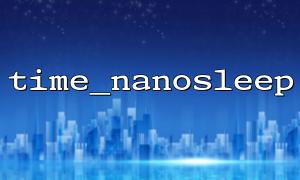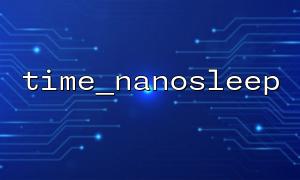In PHP, the time_nanosleep function is used to make the program pause the specified number of seconds and nanoseconds, with higher accuracy than sleep and usleep , suitable for scenarios with strict time control requirements. However, in actual development, we often need to judge whether this function is successfully executed and how to handle it properly when it fails.
This article will explain in detail the method of judging the execution result of the time_nanosleep function and provide reasonable failure handling examples.
bool|array time_nanosleep(int $seconds, int $nanoseconds)
$seconds : the number of seconds paused, integer.
$nanoseconds : The number of nanoseconds paused, integer, range is 0~999,999,999.
Return value:
Returns true on success.
If interrupted by the signal, return an array containing the remaining seconds and nanoseconds.
There are two possibilities for the return value of time_nanosleep :
Return true : means that all sleep time is completed and the function ends normally.
Return array : means that sleep is interrupted by the signal. The array contains the 'seconds' and 'nanoseconds' keys, indicating the remaining time of not sleeping.
Therefore, the judgment method is as follows:
$result = time_nanosleep(2, 500000000); // Sleep2.5Second
if ($result === true) {
echo "Sleep成功完成\n";
} elseif (is_array($result)) {
echo "SleepInterrupted by signal,剩余Second数:" . $result['seconds'] . ",剩余纳Second数:" . $result['nanoseconds'] . "\n";
} else {
echo "Unknown error\n";
}
When sleep is interrupted, developers usually choose to call time_nanosleep again to allow the program to continue sleeping for the remaining time, thereby ensuring the accuracy of the overall sleep duration.
Sample code:
function safe_nanosleep(int $seconds, int $nanoseconds): void {
while (true) {
$result = time_nanosleep($seconds, $nanoseconds);
if ($result === true) {
// Sleep完成,Exit the loop
break;
} elseif (is_array($result)) {
// Interrupted by signal,继续Sleep剩余时间
$seconds = $result['seconds'];
$nanoseconds = $result['nanoseconds'];
} else {
// Other abnormal situations,Exceptions or logging can be thrown
throw new RuntimeException('time_nanosleepExecution failed');
}
}
}
try {
safe_nanosleep(1, 0);
echo "安全Sleep完成\n";
} catch (RuntimeException $e) {
echo "mistake:" . $e->getMessage() . "\n";
}
time_nanosleep executes successfully and returns true , fails (interrupted by the signal) to return the remaining time array.
By judging the return value type, you can clarify whether the function is successful.
When encountering interruptions, using loop recursive sleep remaining time is a common way to deal with it.
Appropriately catch exceptions or errors to ensure stable operation of the program.
Reference documentation is accessible:
https://gitbox.net/manual/en/function.time-nanosleep.php















